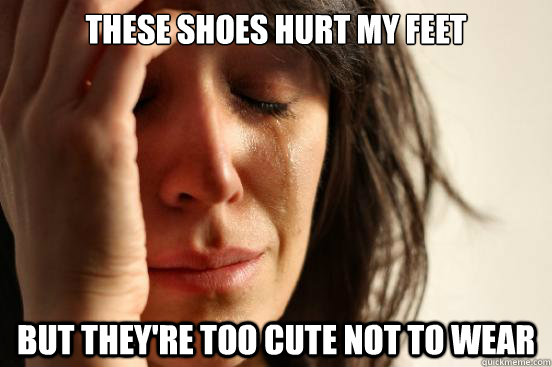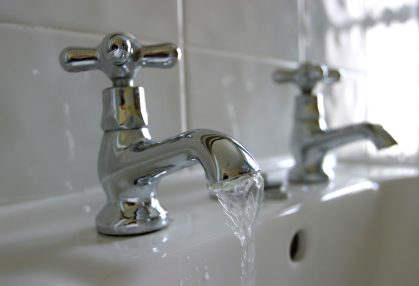
What do I do? What do I do?! Our water usage is already way down thanks to not watering the lawn (seems unbelievable that a garden could use a fraction of the water a plain old grass lawn does, but check your water usage here if you want to corroborate my math); and we collected rainwater this spring to keep from having to water through most of April and May; but there's not a cloud in the sky now. A rain dance seems in order, but troublesome in stilettos.

There may not be rain falling in Southern California (although literally, as I wrote this, a fine mist started to fall just to spite me) but I have figured out at least one option that keep my water usage the same while making sure that my tomatoes don't die on the vine before they ripen. Call it the modern-day version of the rain dance--a way to keep water usage stable despite the increasing needs of the garden: greywater.
Honestly, could there be a grosser name for this? Zombie-flesh-water is a little bit worse, but there's no two words that go together with such a perfectly disgusting connotation as "grey" and "water". It's like what you find in the Convention Center sinks after a thousand cosplay Comic-Con-ers have passed through with their theatrically made-up hands. It's like Buffy the Vampire Slayer's shower drain as she washes vampire dust out of her immaculately straightened hair. It's like washing your hands after being in the Library of Alexandria and realizing you have 1000 years of people's skin cells stuck under your nails. There's a reason "grey" is not always the highest selling nail polish color, because OF COURSE ITS NOT. WHATS WRONG WITH YOU.
Except greywater is making my tomatoes grow out of control and it's awesome.
Basically greywater is any water that you recycle from the shower or the tub. In California water from the toilet and kitchen sink is considered "blackwater" (yeah, thanks for that image, also, O Coiners of Terms. You suck. You've never heard of euphemisms?) and should not be recycled in the yard. It's basically like composting. You don't want anything in the water that you wouldn't put into the compost pile--so essentially you want biodegradable vegetable matter (castille soap, for example, works great as a body wash or a shampoo and can go right into the greywater with the added bonus of keeping aphids away from your vegetable beds). One of the reasons kitchen sink water is considered unsuitable for garden recycling is the amount of grease that typically goes into washing dishes and the grease cutting agents we use in dish-washing soap.
You can install a mechanical greywater reclamation system for your sinks, your washing machine, and your shower if you commit to using the types of biodegradable soaps right for greywater (see a suggested list of products and brand names here) but I've come up with some free ways to parlay my modern-day rain dance into saving some water that would otherwise have gone down the drain.
1. Shower bucket. Low tech, I know, but throwing a bucket into the shower while you are heating the water before you step in can gather around a gallon of water, which just so happens to be exactly what a fruiting tomato plant needs per day. If you use a biodegradable soap like Dr. Bronner's as your body wash you can gather water while you shower too. Don't have a garden? Use the water you gather in the shower to flush your toilets. (See here for how to do it.)
2. Sink bowl. I know, I know, I said kitchen sink water was considered "blackwater" in California, but when you're doing something like rinsing vegetable or fruit matter--in other words, ending up with water that's got compostable materials in it--your plants would actually love both your water and the vegetable bits you were otherwise going to wash down the drain. One of the best ways I've found to gather reclaimed water is in rinsing my juicer (God yes, how stereotypically Southern Californian that I would have a juicer). If you've ever juiced you know that every single freaking piece of that juicer no matter how good of an appliance you have is completely contaminated with fluffy vegetable pulp. While I was rinsing the pieces one day and carefully saving all the pulp for the compost bin, I realized how stupid it was to be throwing the water out because it was "contaminated" with the veggies I was going to put on my plants anyway! Out of curiosity I purposely didn't use soap and put out a mixing bowl to catch the rinse water. I caught a full large bowl full! Into the tomatoes it went. I also use the sink bowl for rinsing my blender after making smoothies, the cutting board after cutting veg, and any pots, pans, glasses or tupperware that held just vegetable/fruit matter.

3. Cooking water. Boiling a pot of peas or cauliflower? Cooking pasta? Don't pour your cooking water down the drain. Don't put it out into the garden hot, either, unless you're killing the weeds in your sidewalk cracks with boiling water. Just drain (assuming no animal products including dairy or meat greases have come in contact with the water) and let it cool down before watering your plants with what basically amounts to a nutrient tea you've just cooked up.
Our soil is so nutrient depleted it's almost worthless; and even the best fertilizer crystals in the world will eventually wash out, leaving your soil as nutrient-poor as it was to begin with. Vegetables need nitrogen, phosphorus, and potassium--essentially the same stuff that they'd get from the soil in a natural food forest environment where part of the crop fell off the plant and made its way back down into the soil, and all the same things you'll be replenishing the soil with when you compost or add water that's been infused with vegetable matter. Our current commercial agricultural system of constantly depleting the soil, refusing to rotate crops, keeping the fields in constant production without soil rest, and flushing the soil with chemicals to encourage growth of attractively-colored but ultimately nutrient depleted (basically pretty, but shallow) vegetables is one of the main causes of our obese but nutrient starved culture. We're hungry but we're never sated because our food, even if we do get something made of actual ingredients like corn or soy, doesn't have anything of value in it. It makes a great case for growing your own food in your backyard where you can have control over what goes into what goes into your body; and drought or not is a great reason to use your vegetable rinse and cooking water in your garden.
Here in Southern California the neighbors are all starting to glare whenever anyone's grass looks any fresher than a nuclear winter; we watch the clouds like farmers of old hoping for any precipitation and the reprieve from counting our water gallons. If there was a rain dance I could do that would nourish my garden, fill my rain barrels, and restore the water table we've just about sucked dry (hey, by the way, thanks to the Nestle corporation for refusing to stop or even suspend bottling operations in northern California during this drought) I would be out in the zombie-grass of my dead lawn in my stilettos working it for all I was worth. Until I get the youtube video of the rain-dance flashmob choreography though? I'll be recycling greywater and eating my delicious organic backyard tomatoes with no water-guilt.
 |
| I just realized that's why Louboutin soles are red--tomato gardening. . Like, 99% sure. Wonder if I could write these off as a farming expense. |
No comments:
Post a Comment